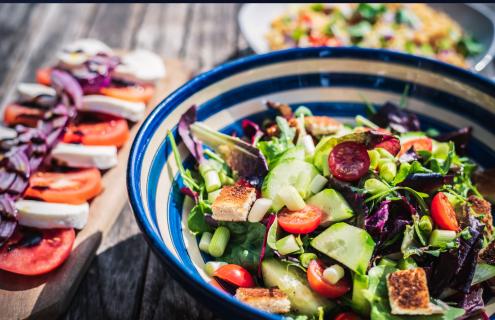
Findings showed that people in the Mediterranean had a longer life expectancy and lower rates of heart disease, certain cancers and diabetes.
Hannah R. Wolf, RD, LDHopefully you’ve heard of the Mediterranean Diet. Here, as part of Dartmouth's and Dartmouth-Hitchcock’s Norris Cotton Cancer Center (NCCC) Oncology Dietician Services’ video nutrition class series, I introduce the basic components of the Mediterranean diet, the benefits—especially in relation to cancer—and ways you can incorporate some of these ideas into your own current diet.
The Mediterranean diet actually goes back to the 1960’s, when a researcher named Ancel Keys wanted to explore the relationship between diet and lifestyle with disease rates, with different populations around the world. “Mediterranean Diet” refers to the dietary patterns of the people living in countries around the Mediterranean Sea, such as Greece and southern Italy. Keys’ findings showed that these people had a longer life expectancy and lower rates of heart disease, certain cancers and diabetes. In this class I explain other research study findings and the correlation between eating patterns and better outcomes such as lower risk of cancer and other diseases.
At its core, the Mediterranean Diet is more of a lifestyle than a diet. It includes physical activity such as walking, dancing and just being around other people. It's not meant to be restrictive—no food is really off limits—it's more about where the focus is with the foods that you eat, a practice called mindfulness. I know it's easy for a lot of us to eat while distracted. I'm even guilty of it, especially at work. You eat while you're working, watching television or reading. But when you can, try getting rid of those distractions and focusing on the food. Savor the experience of eating a good meal.
The staples
Mediterranean Diet basics include foods that are high in vitamins, minerals, antioxidants, fiber, protein and healthy fats. Also, less processed food, meat and saturated fat. Cutting back on processed foods has a lot of benefits. You have lower intake of added sugars and sodium just by eating fewer processed foods and focusing more on foods in their whole form. In this class, we go into detail about staple foods in the Mediterranean diet and what each one does for your body. Some highlights include:
- Fiber. Fiber is important for digestion and keeps us full and satisfied longer. The best way to add fiber to your diet is through vegetables, whole grains, and fruits. If five servings of fruits and vegetables a day sounds like a lot, then start small, like adding some chopped veggies to your omelet in the morning, or adding berries to your yogurt.
- Healthy fats. The main sources of fat in the Mediterranean Diet are olives and olive oil. These are very high in mono unsaturated fatty acids, which have been shown to be very good for heart health. Choose unsaturated fatty acids, such as nuts and nut butters, seeds and avocados, over saturated fats. A registered dietician can help you sort out fat sources.
- Dairy. Two servings of dairy per day, if you can tolerate it, such as cheese or yogurt with beneficial enzymes.
- Eggs. Two to four servings per week of eggs are also components of this diet. Egg yolks contain fat-soluble vitamins, such as vitamins A, D and E.
- Legumes. Beans and lentils are affordable and high in fiber and protein. They’re versatile and can be used in soups, salads, hummus and more—just a great food.
- Protein. White fish and chicken are good lean sources of protein. Fatty fish, such as salmon and sardines, are high in omega-3 fatty acids. In this class I explain the benefit of omega-3s.
- Seasoning. Herbs and spices, rather than salt, make dishes more interesting, which can be great for those with limited sense of taste. A lot of herbs and spices also have antioxidant or anti-inflammatory properties.
Red meats, sweets and alcohol are not forbidden in the Mediterranean Diet, but should be limited and consumed in moderation.
One step at a time
So how can you make this doable for you? Start small. Focus on what you can add to your diet rather than take away from it. I think when you're adding healthy foods to your diet, you end up naturally eating less unhealthy food. It might be adding a serving of veggies to one of your meals. Maybe you chop up some peppers, mushrooms or spinach to add to your eggs. Add a little side salad with dinner or lunch. Snack on raw veggies with hummus dip—a good way to get veggies and legumes in one snack. Aim for leaner meats and smaller portion sizes. Small changes and additions can keep you from feeling overwhelmed.
Really how much to eat depends on your needs. Registered dieticians can help you tailor a plan specific to you. We have long lists of ideas for how to make small changes that work for you and your lifestyle. In this class I brainstorm several ideas to get you thinking, including “Meatless Mondays,” trying one new food a week by maybe strolling around a farmers market, collecting different colors of fruits and vegetables, experimenting with herbs and spices and choosing fruit-based desserts.
So what questions do you have about the Mediterranean diet? The NCCC dieticians are here to answer them and to offer full nutritional guidance to patients with cancer. To make an appointment with an oncology dietician, please visit Oncology Nutrition Services.
A link to the full recorded Mediterranean Diet session with Hannah R. Wolf, RD, LD and other oncology nutrition classes for cancer patients and care partners is available here.